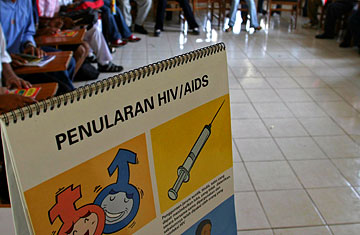
A UNICEF-sponsored peer education training program in Papua, Indonesia
Several years ago in the town of Merauke, on the southern coast of Papua province in Indonesia, a young woman was diagnosed with HIV. Upon learning that she had been infected by her boyfriend, according to a local doctor, the woman decided to take "revenge." She began sleeping with as many men as possible, asking only for a copy of her partner's identity card. Shortly before she died, she told her family to look under her pillow, where they found 50 photocopies — evidence of her self-proclaimed campaign to infect as many men as possible before dying.
Years later, that disturbing case is having some equally unsettling repercussions in Papua. Dr. John Manangsang, who admits the case was an extreme one, has drafted a new bill that would legalize implanting microchips into HIV-infected people deemed to be purposefully infecting others with the life-threatening virus. "The chip would work similar to the chips they use to track birds and animals considered endangered species," explains the doctor, who also sits in the local parliament and proposed legislation to pass the human microchipping. "I don't expect many would be tagged, but after coming across so many HIV cases in my years of practice, something drastic needs to be done."
Dr. Manansang, who was born in Papua, estimates only one or two percent of 67,200 HIV/AIDS sufferers in Papua would qualify for the microchip. "The chip would send off a signal when infected blood comes into contact with non-infected blood so it would monitor the spread." Some 77% of those infected, according to 2006 government data, are indigenous Papuans, who make up about half of the province's population of 2.8 million people. "I am only trying to prevent the extinction of the Papuan people."
Papua does have a major problem on its hands: the province's HIV infection rate is 15 times higher than the national average. Not good news in a country with Asia's highest growing HIV-infection rate, but not everyone thinks microchipping is the way to improve the situation. The proposed bill, now with the provincial parliament, has encountered fierce resistance from local health workers, government officials and church leaders, who say the practice would constitute a human rights violation and do little to address Papua's high infection rate. "Two wrongs do not make a right, and the plan to implant HIV people with microchips is definitely wrong," says Elisabeth Pisani, an epidemiologist and former AIDS researcher in Indonesia. "This sort of nonsense is hardly worth commenting on from a public health point of view, but I think it might give pause for thought to those who are pushing rapid decentralization and local democracy as a development model [in Indonesia]."
Local parliamentarians say they have the support to push the legislation through by the end of the year. If passed, anyone found guilty by a court of law of deliberately spreading the virus could be fined up to 50 million rupiah ($4,000) or given six months in jail. "We need more than just information and condom campaigns," says Komarudin Watubun, the local parliament's deputy chairman who has been leading hearings on the proposal. "Papua is being ravaged by HIV/AIDs and the number of infected keeps going up." Komarudin says the controversial bill may not pass easily, but that it at least merits consideration while the province struggles to find a solution. To date, the province has mostly launched condom campaigns and information campaigns telling locals to not have sex outside of marriage. "The doctor's idea is radical," he says, "but if we don't do something the population could be decimated."
Local government officials agree Papua's high infection rate is urgent, but reject microchips as a solution. "Parliament has the right to propose legislation, but the government must also be invited to weigh in on the issue," explains Agus Sumule, an adviser to the governor of Papua. "When we are, we will try to kill it." Sumule said the governor, Barnabas Suebu, would not be likely to sign the legislation. "The parliament is very worried and wants to take radical measures to curb the spread of HIV," says Matias Refra, the governor's spokesman. "We also agree there is an urgent need for action, but believe more [education] would be more effective."
But the fight may not be over. The law's author argues it would go into effect 30 days after being passed by the local parliament — with or without the governor's signature. (Indonesia's books are full of laws passed by local parliaments that local governments simply don't enforce.) "We have the power to make the laws and we need one to protect healthy people as much as we do the rights of those infected," says Manansang, who has only come across one case of "aggressive" behavior in HIV patients over the course of his 14 years working as a general practitioner at a hospital near Papua's capital. "When people find out they are infected they often get depressed but others undergo a severe change in behavior and get angry. It is only those people we are trying to monitor and keep under control."
